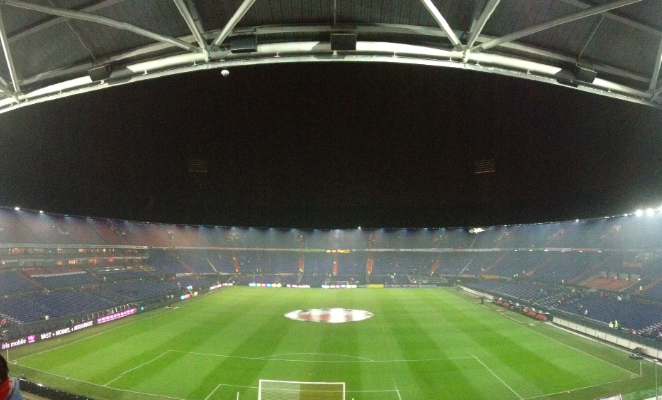World
The New Feyenoord Stadium to have 63000 Seat Capacity

Netherlands – The Dutch architectural firm of Rotterdam, Netherlands – OMA – is planning to build a full fledged football stadium for Feyenoord. This is the Football club of Rotterdam, playing in the Eredivisie Football League.
The stadium would have the capacity of 63000 seats. And this Feyenoord stadium in the Netherlands would become the largest football stadium in the whole country. No new building would take place. OMA is planning to redevelop the existing Feyenoord stadium De Kuip, on the Maas River. This new stadium will replace the already existing stadium and will set new benchmarks in the country.
It is planned to be built as iconic as the previously existing stadium. But in addition, the stadium would meet all the top level UEFA regulations. The design has not yet been finalized. But hopes are extremely high with this new wonderful stadium in the very city of Rotterdam.
Whatever decisions have been taken so far, according to them, the new stadium will have the similar form of a bowl with curved seating arranged close to the pitch. Each seat is planned in a way to give extravagant view of the field to the viewers.
On non match days, the organization plans to host concerts or other events to keep the venue booked maximum times. Along with that, the area would also have shopping complex, offices, apartments, etc. It would become a mixed purpose area very soon in future.
This Feyenoord stadium is one of the master plans of the architectural firm, OMA. The place where this stadium is being built has a lot more offices and buildings built by the firm. This stadium would add another feather to the achievements of the company.
And this new stadium would open up to public in 2023.
World
Meet the Team: The Experts Driving Phoenix Capital Group’s Vision

A popular saying in business is that behind every successful company stands a skilled and dedicated team of professionals working every day to achieve more. That’s the case at Phoenix Capital Group Holdings, LLC, where experts drive the company’s vision to new heights.
Thanks to the hard work and dedication of its exceptional team, Phoenix Capital Group consistently strives to deliver value and high-quality returns to individual landowners and investors in the oil and gas industry.
Here are a few of the experts leading the charge at Phoenix Capital Group.
Adam Ferrari, Chief Executive Officer
Adam Ferrari, the son of co-founders Daniel and Charlene Ferrari, serves as the CEO of Phoenix Capital Group. With nearly 20 years of experience in the oil and gas industry, Adam has been instrumental in leading the company and focusing on key initiatives that drive substantial growth.
Raised in a small farm town in Illinois, Adam learned the values of hard work, grit, and determination from an early age. He graduated magna cum laude from the University of Illinois at Urbana-Champaign with a degree in chemical engineering. Starting his career at BP in the Gulf of Mexico, Adam honed his engineering skills before moving through various leadership roles at the company and later transitioning to investment banking at Macquarie Capital.
Adam’s entrepreneurial spirit led him to found multiple oil and gas ventures throughout his career. Phoenix Capital Group is the culmination of his diverse experiences and his most significant project to date.
Adam is married to Brynn Ferrari, the CMO of Phoenix Capital Group. They have a young son and hope to expand their family in the future. Outside of work, Adam enjoys spending time with his family, exploring local cuisine with Brynn, and watching USC Trojans football.
Curtis Allen, Chief Financial Officer and Partner
Curtis Allen brings over 10 years of experience in financial services—with a strong emphasis on investment analysis—to his role as CFO and Partner at Phoenix Capital Group. A CPA, Curtis has a broad range of financial experience, from preparing private taxes to auditing billion-dollar defense contractors. He has managed investments for corporate and personal clients for over seven years and holds Series 7 and 66 licenses. He has also passed the CFA Level 1 exam.
At Phoenix Capital Group, Curtis oversees all finance and accounting functions, as well as various day-to-day operational tasks.
A family man, Curtis is married with two children. Outside of work, he enjoys outdoor activities such as playing beach volleyball with his wife and bicycling with his family.
Lindsey Wilson, Chief Operating Officer and Partner
Lindsey Wilson, COO and Partner, brings extensive practical experience to Phoenix Capital Group. She has led various diverse, multidisciplinary teams within the energy sector, and she prides herself on setting and achieving aggressive business goals while ensuring all employee needs are met.
A founding member of Phoenix Capital Group, Lindsey manages and oversees the company’s daily business operations. She works closely with all supervisors and department heads to support the day-to-day activities of all employees.
Lindsey began her career in the oil and gas industry in 2011 as a leasing agent in Fort Worth, Texas. This foundational experience served as a springboard, allowing her to transition into more advanced roles within the mineral and leasehold acquisition space.
Combining her practical oil and gas experience with skills gained in sales, marketing, and underwriting in the hospitality and banking sectors, Lindsey has successfully led Phoenix Capital Group’s multi-functional organization. She holds a BBA in Marketing from the University of Texas at Arlington.
Lindsey is married with a daughter. She enjoys spending time with her family and training for marathons.
The Entire Team at Phoenix Capital Group Contributes to Its Success
Adam, Curtis, and Lindsey have over 60 years of combined experience in the energy sector. They bring a diverse array of skills in software development, engineering, finance, and more to Phoenix Capital Group.
However, the company’s immense success would not be possible without the dedication, skills, and hard work of the entire team.
The large and diverse team at Phoenix Capital Group focuses on minerals, investments, operations, marketing, land, finance, technology, and more. Through their combined effort, they contribute to the company’s ongoing success and growth.
About Phoenix Capital Group
Founded in 2019, Phoenix Capital Group Holdings, LLC is a leading oil and gas mineral rights acquisition, investment firm, and operated working interest company dedicated to discovering untapped value on behalf of landowners across the United States. The family-owned company is a technology-led and client-centric focused organization dedicated to developing partnerships with its clients through property acquisitions and investment opportunities. With a team of experienced professionals with expertise in software development, engineering, and finance, Phoenix Capital Group boasts over 60 years of combined experience in the energy sector, focusing on capital deployment and asset management.
-

 Tech4 years ago
Tech4 years agoEffuel Reviews (2021) – Effuel ECO OBD2 Saves Fuel, and Reduce Gas Cost? Effuel Customer Reviews
-

 Tech5 years ago
Tech5 years agoBosch Power Tools India Launches ‘Cordless Matlab Bosch’ Campaign to Demonstrate the Power of Cordless
-

 Lifestyle5 years ago
Lifestyle5 years agoCatholic Cases App brings Church’s Moral Teachings to Androids and iPhones
-

 Lifestyle4 years ago
Lifestyle4 years agoEast Side Hype x Billionaire Boys Club. Hottest New Streetwear Releases in Utah.
-

 Tech6 years ago
Tech6 years agoCloud Buyers & Investors to Profit in the Future
-

 Lifestyle4 years ago
Lifestyle4 years agoThe Midas of Cosmetic Dermatology: Dr. Simon Ourian
-

 Health5 years ago
Health5 years agoCBDistillery Review: Is it a scam?
-

 Entertainment5 years ago
Entertainment5 years agoAvengers Endgame now Available on 123Movies for Download & Streaming for Free
